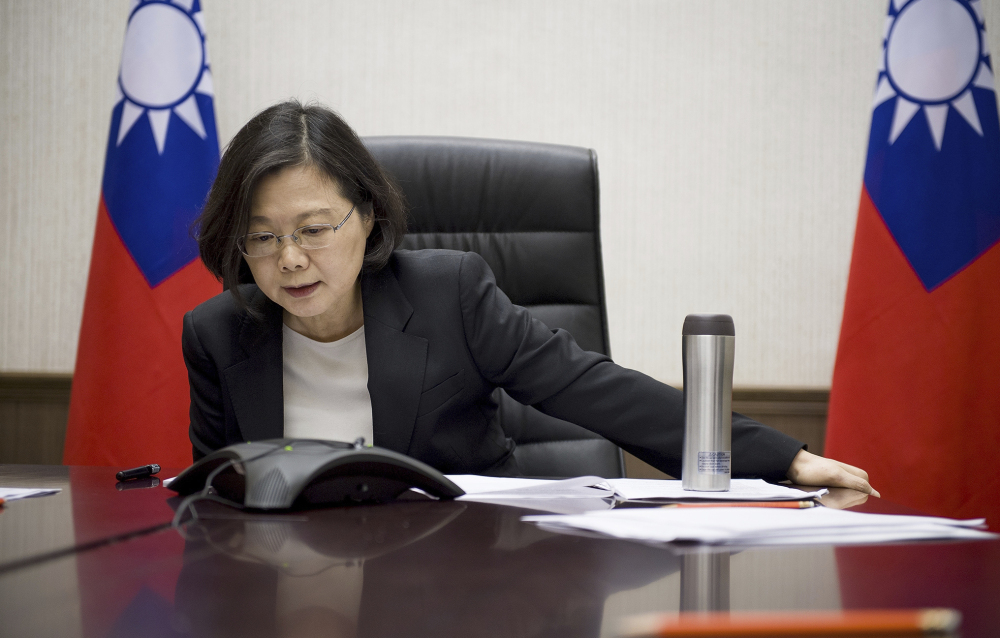China lodged a complaint with the U.S. after President-elect Donald Trump flouted almost four decades of diplomatic protocol by directly speaking with the leader of Taiwan, which Beijing considers a rogue province.
The “solemn representation” on Saturday urged U.S. authorities to adhere to the so-called one-China principle and “prudently” handle issues related to the self-governed island. Chinese Foreign Minister Wang Yi said that Trump’s Friday telephone call with Taiwanese President Tsai Ing-wen was a “little trick pulled off by Taiwan,” saying, “We don’t want to see this political foundation disturbed and damaged.”
The response suggested China’s desire to keep the incident from escalating into a full-blown crisis before Trump entered the White House or even appointed a full foreign policy team. Statements from Trump’s transition team and his subsequent tweets left unclear whether the call presaged a shift in longstanding U.S. policy against recognizing Taiwan’s sovereignty or allowing direct communication between top leaders.
“This could be potentially explosive, but now is not the right time for Beijing to make the formal call on Trump’s Taiwan policy because he’s yet to take office,” said Wang Fan, director of China Foreign Affairs University’s Institute of International Relations. “He’s still learning and doing his home work. China’s measured response would give him some time to do a crash course on the history of Sino-U.S. relations.”
The U.S. broke diplomatic ties with Taiwan and officially recognized the Communist government in Beijing in 1979. Still, it has maintained a close relationship with the democratically run island – often to China’s anger – and is legally required to provide military support and protection. President Obama announced a $1.8 billion arms sale to Taiwan last year, drawing protests from China.
Trump’s transition team sent a statement saying that Taiwan’s president congratulated the Republican on his victory and the two “noted the close economic, political and security ties” between the two sides. The call lasted more than 10 minutes, Taiwan’s presidential office said in an emailed statement.
“The President of Taiwan CALLED ME today to wish me congratulations on winning the Presidency. Thank you!,” Trump later said on Twitter. “Interesting how the U.S. sells Taiwan billions of dollars of military equipment but I should not accept a congratulatory call.”
Taiwan is considered the most sensitive issue between the U.S. and China, who were each other’s largest trading partners last year, exchanging goods and services worth $627 billion. The island of 23.5 million people has been ruled separately since 1949, when Chiang Kai-shek moved the Republic of China government there at end of the Chinese civil war.
While ties between Beijing and Taipei have improved over the decades, China continues to have some 1,200 missiles aimed across the Taiwan Strait and has asserted the right to invade to block any formal split. Tensions have increased since Tsai’s landslide election win in January, because her party officially supports independence and she has personally refused calls to reaffirm the one-China principle.
Taiwanese presidential office spokesman Alex Huang said after the call that good Taiwanese-U.S. relations were as important as cross-strait ties. “It’s in line with national interests, and critical to regional peace,” Huang said. “Those are goals of the government and there’s no conflict among the goals.”
Wang, China’s foreign minister, said Saturday that the call wouldn’t affect consensus of the international community that recognized the government in Beijing, according to the official Xinhua News Agency. “I don’t think it will change the one-China policy of the U.S. government either,” he said on the sidelines of a foreign policy seminar.
Trump has yet to name a secretary of state. The White House this week encouraged Trump’s team to reach out to experienced U.S. State Department officials as the president-elect continues to field calls from world leaders.
An Obama administration official, who spoke on condition of anonymity, said the White House wasn’t notified about the call.
Send questions/comments to the editors.


